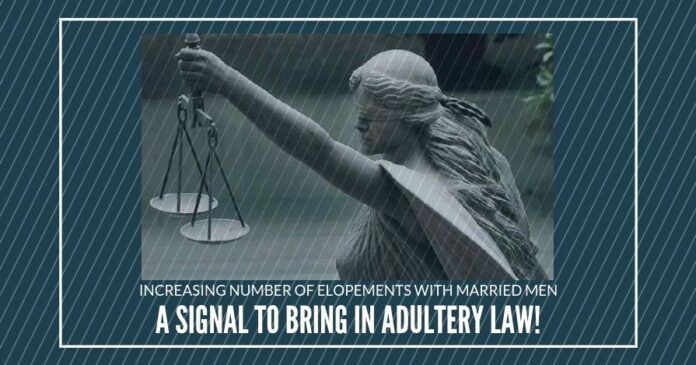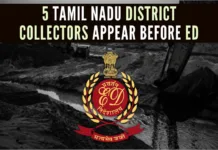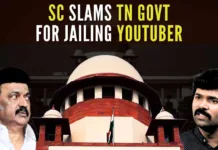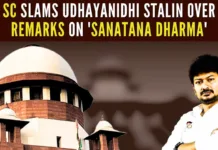
Section 497 on adultery has been scrapped but not replaced by a fortified Section to deter extramarital relationship with anyone other than his spouse.
Just a month after the Supreme Court of India scrapped Section 497 of the IPC on Adultery, we happened to hear the Madras High court expressing concern over the increasing cases of minor girls eloping with married men. A division bench of Justice N. Kirubakaran and Justice S. Baskaran observed on 1st November 2018 that four such cases had come up for hearing on that day alone making them express their worries on the rise in such cases. Since the cases involved minor girls of under-eighteen, the judges turned their attention to POCSO Act (The Protection Of Children from Sexual Offences Act) and directed the State to furnish a report on cases booked under this Act in the last 10 years. They also put the onus on parents and teachers to educate their teenage girls and wanted the Government to introduce counselling programmes for teenagers from getting lured and for parents and teachers for sensitising their wards to the dangers from luring persons.
Once the girl completes her 18th year, no judge of India can stop her from eloping with that older married man.
Advisories such as this serve no purpose if they are really intended to make a change. There is no dearth of advises and advisories in our families but what makes one cross the boundary is that there is no fear of punishment. Take for example the helmet rule. The fatality rate is such that 73.14% of the death of bikers was due to the non-wearing of helmets, according to the Government release. Although the Government of Tamilnadu had made it mandatory for all bikers and pillion riders to wear helmets, following the directions of the High court, it is rare to see helmet wearing riders on the streets where there is no traffic police in sight. Not that people are not aware of the helmet rule or the hazards of not wearing it, it is simply that they won’t be caught for not wearing. That is human mentality and the mentality of most people in India. Only fear of punishment keeps one to behave well even in advanced countries.
One can as well dismiss the helmet rule as an intrusion in one’s personal liberty and one’s privilege of likes and dislikes. But it is made compulsory as per Section 129 (a) of Motor Vehicle Act 1988 to afford a degree of protection from injury to the rider. Why should the Government worry about the safety of the rider who himself is not much worried about it? It is because the Government takes care of the safety of the person. When the person for whose sake this rule is made, is caught not wearing it, the State is empowered to penalise the person. With so much care running into the safety of the individual it is just inadmissible that similar care is not shown in the case of the individual embroiled in adulterous activities. There is no physical threat to the life of the one involved, but one cannot turn a blind eye to the indescribable mental torture undergone by those closely related to the person.
For example in the case under the purview of the judges who expressed their anguish with the increasing number of eloping cases with married men, a 17-year-old girl had eloped with a 45-year-old married man. On the complaint by the mother of the girl, the police went on a search and nabbed them in three days. The man was slapped with kidnapping charges while the actual intention was not that. He again eloped with that girl when released on bail and this made the mother move the court with a habeas corpus. It was while dealing at this stage, the judges had asked for a report on the POCSO Act. POCSO is once again a deviation from the original intent of the offence. Once the girl completes her 18th year, no judge of India can stop her from eloping with that older married man. In the melee, the man’s wife and her children from him and the girl’s parents and her siblings are going to be left with terrible trauma for no fault of theirs, but for the fault of faulty judicial laws!
In an advanced country like the USA, the Arizona adultery statute penalises both the persons if one of them is unmarried.

If the judges think that the girl has been unduly lured by the man, the same continues to hold good from the 1st day of her 19th year – that is., once she crosses her minor status. So the bottom-line of the issue is not her age, but the inadmissibility of the relationship she has with that man. Without admitting it and by passing on the responsibility to the parents and the teachers, the judiciary is perceived to have lost focus by slapping kidnapping charges and POCSO.
Suppose there is an adultery law penalising them, both of them could have been deterred from their adventures and their families could have been spared of death like agony. Unfortunately, there is no law in this country to check the elopement of a major girl with a married man. The only law on Adultery was the now scrapped Section 497 of IPC which was anyway a faulty law as it was based on a faulty notion of adultery committed by a married man and a married woman. Nothing can be more ludicrous than this, as even if one is already married while the other is not, it still amounts to adultery. In an advanced country like the USA, the Arizona adultery statute penalises both the persons if one of them is unmarried. The trauma such a relationship causes to the family members of those in adultery is huge enough to justify penalisation of both of them.
Unfortunately, none of the six Sections of Chapter XX of the IPC on offences relating to marriage speaks about the extramarital relationship with an unmarried woman. The only one on adultery had now been scrapped but not replaced by a fortified Section to deter extramarital relationship with an unmarried major girl (or anyone other than his spouse). The State and the judiciary cannot wash off their hands in the pretext of personal liberty as done by the 5-member bench headed by CJ Dipak Misra when it dismissed Section 497 of IPC as violative of Article 14 and Article 21 of the Constitution, because what is at stake is not the personal liberty and freedom of an individual or even consensual relationship, but the trauma caused to the legally wedded spouse of the one in extramarital relationship. Justice must be done to her by punishing the errant spouse even though their marriage is doomed for a divorce.
A judicial system that does not invoke Article 21 in giving freedom to a person to make a choice in wearing helmet or not.
Article 21 was behind another judgement of a similar type in the year 2010 when the Supreme Court did not find any offence in a live-in relationship. While quashing 22 criminal cases filed against actress Khushboo for her alleged endorsement of pre-marital sex, the Bench asked for evidence to show that girls eloped from their homes after hearing the actress endorse pre-marital sex. Can the same yardstick be applied to the present case under discussion? The rise in the number of minor girls eloping with married men as observed by the High Court Bench a recent phenomenon after decriminalisation of adultery? The specific reference to 4 such cases on 1st November seems to support a sudden spurt in the number of cases after decriminalisation of adultery by the Supreme Court. There is a case of suicide too, by a woman on hearing her husband justify his extramarital affair on the basis of the verdict by the Supreme Court.
Only the cases involving minor girls had come to the court. How do we know how many major girls had eloped with married men for, there is no way they come under the purview of the court? A judicial system that does not invoke Article 21 in giving freedom to a person to make a choice in wearing helmet or not, is allowing the destruction of families and family peace and passes sermons to parents and teachers on issues that involve a third party (the married man) who can be deterred only if a proper law is in place.
Before concluding it is not out of place to quote here what the judges in Khushboo-case asked the complainants. They asked whether the complainants had any daughters. When the answer was in the negative, the judges commented how then they were adversely affected by Khushboo’s support for pre-marital sex. Never knew that judicial empathy is so easily definable that I am tempted to ask the judges of the High Court and the 5 member bench of the Supreme Court whether none of them had daughters. If they had, weren’t there any cases of extramarital affairs in their families? This is being asked to point out the stunted logic in their comment and how disconnected the judges are with the real-life hazards faced by millions of families in India.
Note:
1. Text in Blue points to additional data on the topic.
2. The views expressed here are those of the author and do not necessarily represent or reflect the views of PGurus.
- Was Taj Mahal a Hindu temple or a palace or part of a twin temple? - November 13, 2023
- Does Agnihotra Homa offer protection from Corona Virus? - March 21, 2020
- Kejriwal owes his victory to MK Formula – the Coronavirus of Democracy! - February 14, 2020











This is a good article only within a certain ethical framework. It doesn’t take into account the social consequences of a puritanical setup.
The famous Bollywood couple provides us with a good counter example. They changed religion to Islam because he was already married. Do you really want people to leave Hindu dharma just because the law forces them to?
There is other evidence to support a more liberal framework. Eight different type of marriages have been described in Hindu mythology. Has the author ever wondered why?
Finally, Lord Krishna had 16000 wives. Does that tell us something about social justification of a liberal view? I bet it does.
I urge you to think again and be more willing to accept multiple moral Frameworks.
if you don’t agree with the author of this article,please ignore but don’t criticise, its her view too.Some ones food is perhaps some one else poison.One can not please all.From what is seen of late happening in our country is that some group of people are trying to pluck out the very foundation stones our country is built on.Some may see red and some may not see.To each his or her own.What was the great hurry in removing adultery clause??Indian Judiciary needs to be overhauled,radical change is required here (one judge called way back that indian judiciary is an ASS ) or we will see too soon animal sex also encouraged in our country,mind you there will be again lots of people supporting and many against it too.Considering the yug that we are in you can easily imagine who will win eventually.God save this nation.In short i can say that moral fabric of our great nation is torn and in tatters now.
Nicely argued.
Only potential cheaters and promiscuous degenerates who believe in sharing their wives in orgies would ridicule this article and support the abolition of adultery laws.
Many of these decisions are aimed at doing away with the concept of marriage and family system itself. By giving live-in relationship the recognition and rights at par with a lawful wedding they’ve essentially eliminated the need for marriage.
Pretty soon this will invite the stupid concept of open marriages, broken families and the outcome will be broken adults. Not to mention various sorts of STD’s too becoming common.
A significant section of culturally illeterate and politically foolish people don’t realise that this judgement is actually endorsing the cardinal goals of communism which are 1)To make women available to the society. 2) Destruction of family as a social and economic unit. 3) Unrestrained sexual intercourse. 4) Alienation of children from parents. Marx and Engles wrote this in their manifesto.
The author seems to suggest that such cases didn’t happen earlier have started after striking down of adultery law. This is a fallacious argument and not supported by data. The author should learn to move with times. Judiciary has no place in personal space of individuals.
Silly, foolish, article.
It is not for Courts but society, families to provide guidelines.
Incidents, tragic one will happen.
That does not mean we make more and more unenforceable laws.
it is paramount that laws also become severe to punish the offenders.if individuals have to decide there is no need to live as a society and be governed by and ruled by laws.we all can be on loose.on the other hand we started living as society with morals to straighten us.those who want a vertical split in this must form another society and live in another land including the judiciary who instead of reinstating the wayfarers proposes opinion to support immorality.this vertical split is because of people like you.you cannot support immoral acts unless you love to do them.
Thank you and the author for this article which will be attacked mostly by the #MeToo type “liberated” women. the damage is complete. Nothing can be done and we must leave everything in the hands of the Divine and wait for Pralay.
This phenomenon reflects self destructive choices made by the older man and younger girl. Their relationship will fail eventually. Both will be left with crappy lives, with self loathing and kids who hate them.
Such relations are more of an abusive relation by psychologically unstable people. It needs medical intervention or time to heal.
The Author is biased and partial in her analysis towards illicit relationship. My only question is why should only the man be punished for these illicit affairs. Further, IPC 497 was dismissed by the Hon’ble SCI because it only punishes the man and not the Women who is also part of this mischief. So, there should be an holistic approach and not from an feminist point of view as presented here.
please read properly.she wants both the offenders to be punished man or woman.both should be burnt alive.
I do not understand how the author is comparing some laws in USA. Sex and drug in USA starts with school children and they are worried about the situation. How the author compares the situation in USA and in our country.